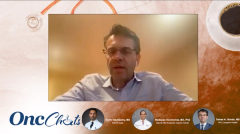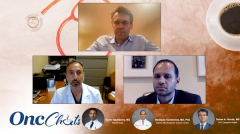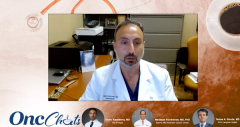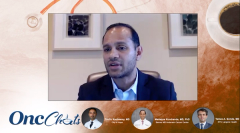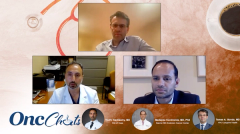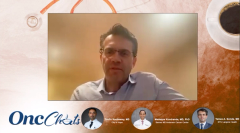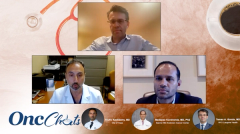
Leveraging Endoscopic Ultrasound in Pancreatic Cancer: Additional Studies Are Needed
In this fifth episode of OncChats: Leveraging Endoscopic Ultrasound in Pancreatic Cancer, Toufic A. Kachaamy, MD, Madappa Kundranda, MD, PhD, and Tamas A. Gonda, MD, underscore the need for additional research evaluating the role of radiofrequency ablation and other approaches in pancreatic cancer, and avenues that are ripe for further exploration.
Episodes in this series

In this fifth episode of OncChats: Leveraging Endoscopic Ultrasound in Pancreatic Cancer, Toufic A. Kachaamy, MD, of City of Hope, Madappa Kundranda, MD, PhD, of Banner MD Anderson Cancer Center, and Tamas A. Gonda, MD, of NYU Langone, underscore the need for additional research evaluating the role of radiofrequency ablation (RFA) and other approaches in pancreatic cancer, and avenues that are ripe for further exploration.
Kachaamy: So, these are early data in human trials [suggesting that] RFA could potentially increase the chance of R0 resection?
Gonda: Correct. I think I would still say [they are] early data in key series and phase 1 trials. This technology is still quite new, and of course, we want [to see] longer-term data. We’re not at the point of really saying that this has shown true efficacy in a randomized clinical trial. What is important to recognize is that [this approach] is a quite safe and potentially reasonable adjunct to chemotherapy. I think we will have to collect much more data to exactly understand whether it adds to the efficacy of neoadjuvant chemotherapy, for example.
Kundranda: Also, Dr Kachaamy, just to go back to that statement, I concur with Dr Gonda because the key thing is, I think all of us recognize that pancreatic cancer is a systemic disease. We start off by saying 20% of [these cases] are resectable, but truly, that’s not the case. Unfortunately, what happens is, in the 20% that we see, we clump all these patients who are borderline resectable and truly unresectable who we’re hoping can be resectable, with neoadjuvant chemotherapy. So that number of patients significantly drops after systemic therapy, because about 40% of them do develop metastatic disease within the first few months when they’re receiving neoadjuvant therapy. The number further drops, and so you’re truly dealing with about 10% of these patients. Even within these 10% of patients, we’ve known for some time that going and performing a Whipple with a positive margin does not improve overall survival.
So, with that being the case, we’ve gotten much better at determining whether [the disease] is borderline resectable or unresectable based on the venous and arterial involvement. Those [cases that] are borderline resectable are the ones [for which] we’re trying to give the patient the best opportunity to have an R0 resection, to give them the best [possible] outcome. In those cases, what we typically end up running into is, [the patient gets] systemic therapy for a period—it could be 3 months, it could be 6 months, it could be a doublet regimen vs a triplet regimen—and then, for the most part, we try to consolidate it in some way or form. The consolidation could be stereotactic body radiation therapy [SBRT] or it could be RFA; it could be any of these local measures, but what you’re trying to do in that case is get an R0 resection, get some local control before you go in [so you can achieve] the best outcomes.
I think it’s important to note that paradigm and to recognize that paradigm when we’re trying to sequence therapies because this is a regular discussion at our tumor boards wherein we have this borderline resectable [case], we look at the imaging, there’s still some degree of vascular involvement, and we’re [questioning whether it’s] inflammation or true vascular involvement. I’m sure that all of you have had these discussions at your tumor board. I just wanted to point that out.
Kachaamy: Yes, so what I'm hearing you say is that you’re somewhat skeptical about the role of local therapy in this disease.
Kundranda: There is a role for local therapy, and I think the role of local therapy is more in the consolidative realm. The research aspect of it is what we are looking at, which is that abscopal effect, whether it’s RFA, whether it’s SBRT, or any of those [approaches]. So, there are 2 different discussions [going on] here, but I certainly think there is a role for local control in patients with locally advanced pancreatic cancer.
Kachaamy: What kind of studies and what kind of outcomes do you want to see if we’re looking to study RFA to make a significant impact on oncology practice and pancreatic cancer [treatment]? What would you like to see done from the RFA [standpoint]?
Kundranda: That’s a great question. There was actually a recent article that was published [on] a prospective study [that was done in] a small population of about 10 patients. This [effort] came out of Houston; they looked at patients getting RFA, and then there were patients who [received] FOLFIRINOX, which is the triplet drug regimen, and some of them got gemcitabine [and nab-paclitaxel (Abraxane)], and some of them got gemcitabine, cisplatin, and nab-paclitaxel. These are regimens that we’ve used in the neoadjuvant setting.
Although [the study] has 10 patients, and I would be very skeptical in terms of truly [reading into] the outcomes, the median survival that was reported was close to 2 years. Nevertheless, more than the survival benefit, the one thing that it had demonstrated was that you could very well do an endoscopic ultrasound RFA concurrently with standard chemotherapy. I think that is the key [takeaway from] that study, at least for me. Because whether changes, downshifts, and stage shifts in the cancer truly help in improving overall survival remains to be seen and to be determined, but the one thing we have are the safety data.
Any further studies that we look at [are] truly using what we currently have: systemic therapy up front, followed by local therapy, vs patients going in for surgical resection. Then, looking at the outcomes would be the way that I would randomize it.
Check back on Tuesday for the next episode in this series.


